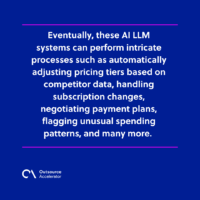Stripe’s open for business from AI agents
Artificial intelligence (AI) large language models (LLM) are improving by the minute and could soon radically change consumer and business behavior.
Payment processing platform Stripe’s new AI agent can now make purchases independently on behalf of customers. For example, a user could ask the agent to look for plane tickets within a specific budget. The agent will then look and analyze the options based on the user’s specific parameters to complete the transaction using Stripe’s single-use virtual cards.
This innovation eliminates the usual friction points in the customer journey. Instead of navigating multiple websites, comparing prices, and manually entering payment details, customers can now simply state their requirements to an AI agent.
Hands-free business automaton
The benefits it will bring to customers are endless. On the flip side, experts claim that such a system is perfect for companies that handle high volumes of transactions, such as entertainment/travel ticket vendors, subscription-based businesses, and online retail shops.
Traditionally, when these businesses enter the critical stage of rapid growth, they flock to the labor market to increase their headcount. While this empowers them to accommodate the surge in demand, they inevitably encounter redundancies and mounting salary expenses that stifle their momentum.
A system equipped with a sophisticated AI LLM that can handle transactions autonomously will eliminate such inefficiencies. This is not to say that bots will eliminate the role of humans. Rather, businesses will continue boosting their workforce but with greater clarity and direction.
With a bot dedicated to handling data-heavy and administrative work, firms can focus their efforts on hunting for talented professionals in marketing, business development, finance accounting, and more. Job descriptions are more defined and would lead to a leaner workforce, which is what every business dreams of.
Tip of the iceberg
Experts believe that autonomously handling transactions is just the beginning. Eventually, these AI LLM systems can perform intricate processes such as automatically adjusting pricing tiers based on competitor data, handling subscription changes, negotiating payment plans, flagging unusual spending patterns, and many more.
Today, these processes are handled by big businesses armed with sufficient capital. But as AI LLM systems get better and cheaper, smaller companies can also use them to accelerate their growth.
This new development signals a fundamental shift toward hyper-personalized, AI-driven customer experiences. For businesses, it gives them greater control over their operations, whether managing their workforce or parsing critical data.
The question for your business
Are you integrating AI LLMs in your operations?



 Independent
Independent





















